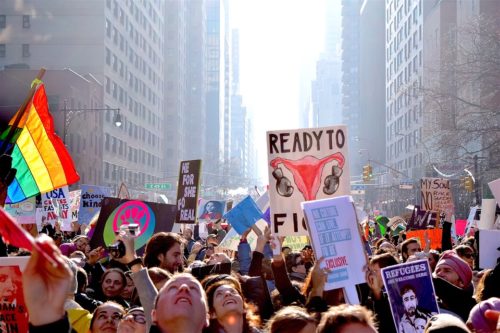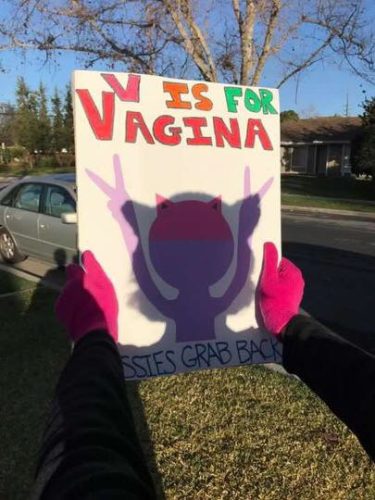![]()
As a minority community, many American Pagans met the beginning of 2017 with trepidation, with the inauguration of a new president who seemed hostile to values that many Pagans hold dear. Between the new president’s recorded admissions of sexual assault and misogyny, and the evangelical Christian movement had propelled him to power, there was fear that the new administration would roll back gains made in social issues such as women’s and LGBTQ+ rights, and freedom from religious persecution.
In this environment, one day after the inauguration of President Trump, the Women’s March on Washington burst onto the international scene. In a well-coordinated protest effort, millions of women and men in iconic pink “pussy” hats flooded cities all over the world to stand up for what they saw is inalienable human rights that were under threat. The Washington, D.C. march famously attracted more attendees than the inauguration itself, and that pattern repeated itself in cities across the U.S. and, indeed, all over the world. Ultimately, it was “the largest coordinated protest in U.S. history and one of the largest in world history,” according to organizers.

[Pixabay.]
The energy of the 2017 protest inspired many Pagans to support the movement. Rev. Erica Baron, a Temple of Witchcraft high priestess and Unitarian Universalist minister, attended the 2017 march in Poughkeepsie, New York. “There was a certain energy,” she states, “although the moment felt very grim.” She remembers, “I was happy to be among so many people who shared my values, which felt very much under attack, and still do.”

[T. Titus.]
Back on the East Coast, Fred Isom participated in Boston. The rally on Boston Common included speeches from Boston Mayor Marty Walsh and U.S. Senator Elizabeth Warren. Isom was struck by the solidarity in the presence of strong diversity. He remembers “an overall sense of unity in the air that day among the rally-goers that seemed to transcend the unique identities that made us different.” More important than cultural and religious differences, says Isom, is that “we were all there for one cause, to resist and stand up for our values, science, and our freedom.”
“By the end of the day,” recalls Isom, “millions had marched not only across the country but around the world…the world was restless, vocal, and not going anywhere quietly.”
Paliechesky had a similar experience, saying that “women showing up in numbers has given courage to those who might stay silent.” She sees a connection to the original march, and the recent revelations of women in Hollywood and other sectors of the entertainment and business industries speaking out against sexual assault, a movement that has made such an impact that it was featured as Time magazine’s “Person of the Year.”
“The march showed that we can mobilize. That we can succeed,” says Paliechesky. “I think the women’s march was a response to being complacent,” she says, and the 2017 march reminded women that “we need to speak up, show up, and never surrender.”
Baron agrees, noting that “it feels like women are feeling a new energy to stand up against misogyny, discrimination, mansplaining, and the various other manifestations of sexism in our culture.”

[Wikimedia Commons.]
Pagan religious practices may be able to offer a unique and powerful perspective on the issues fueling the upcoming women’s march. “Paganism has a reverence for femaleness, both in humans and the divine, that can be missing from some more dominant traditions,” says Baron. “At our best, Pagan spirituality is deeply empowering to individual women, and to women’s leadership in community.”
Noting the common Pagan veneration of the sacred masculine and sacred feminine as equals, Isom believes the larger culture could benefit from Pagan wisdom “as a manifestation in our own relationships with others.” For example, “if anyone tried regulating what a man does with his body, most would instantly scoff at the notion.” Why, he asks, “must we continue to live in a world where women are still regarded as ‘less than’ and incompetent when it comes to ownership of their bodies?”
Paliechesky adds to this, noting that “we have as Pagans a community and values that hold nature and individuals as sacred. Peace. Compassion. Community. Equality. These are ideals,” she says, that “sound like good ones to me.”
As the 2018 march draws near, these Pagans have high hopes for what it can do. Paliechesky expects it to be “bigger, stronger.” She hopes to show “that we will not go away, but will stand together. That we will strike fear into the hearts of those that seek to ignore the will of the people.”
Similarly, Isom hopes it will emphasize “that we are all equal as humans, and that we must continue to fight for equality and decency when there are voices that seek to disrupt the efforts to achieve that balance.”
Striking a conciliatory tone, Baron hopes for “a constructive conversation at some point.” She agrees that abuse must be called out and resisted, but, she asks, “what are we fighting for?” She hopes for an eventual determination of what “the right boundaries for sexuality and power in the workplace” are. “How can we build movements that empower all women,” she asks, “not just white, able-bodied, economically comfortable women?”

[T. Titus.]
“It’s the right thing to do,” concludes Baron. “Because we all do better when they do better.”
* * *
The views and opinions expressed by our diverse panel of columnists and guest writers represent the many diverging perspectives held within the global Pagan, Heathen and polytheist communities, but do not necessarily reflect the views of The Wild Hunt Inc. or its management.
The Wild Hunt is not responsible for links to external content.
To join a conversation on this post:
Visit our The Wild Hunt subreddit! Point your favorite browser to https://www.reddit.com/r/The_Wild_Hunt_News/, then click “JOIN”. Make sure to click the bell, too, to be notified of new articles posted to our subreddit.
